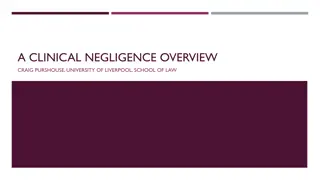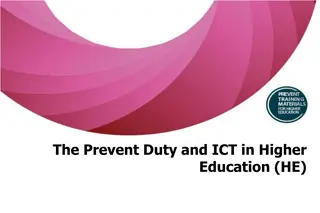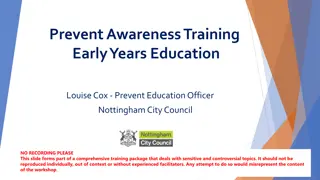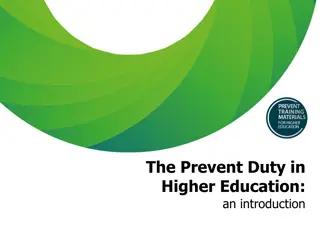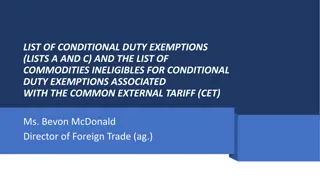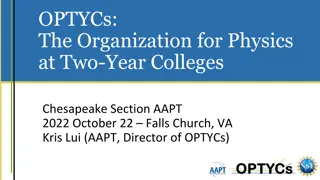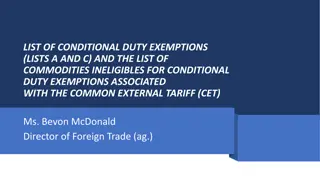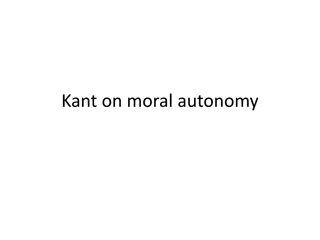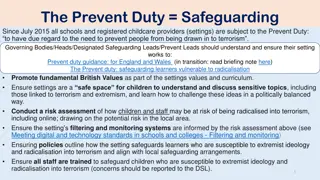Understanding the Prevent Duty in Further Education and Sixth Form Colleges
The Prevent Duty is a statutory responsibility that applies to various education providers, including those not receiving public funding. It involves safeguarding learners against extremist influences, necessitating risk assessments, clear policies, and staff training. Exploiting vulnerable individuals for extremist purposes falls under safeguarding duty, emphasizing the distinction between extremism and legitimate political engagement.
Download Presentation

Please find below an Image/Link to download the presentation.
The content on the website is provided AS IS for your information and personal use only. It may not be sold, licensed, or shared on other websites without obtaining consent from the author. Download presentation by click this link. If you encounter any issues during the download, it is possible that the publisher has removed the file from their server.
E N D
Presentation Transcript
Selina Stewart Lead associate: Prevent duty Further Education and Sixth Form Colleges Seminar
The Prevent Duty AOC (owners) This is a statutory duty The Prevent duty applies to EFA and SFA funded colleges, adult education and independent learning providers Our Board (governance) The Education and Training Foundation Expert panels (advice and insight) AAETO (owners) BIS (funders)
Who is covered by the Duty? The duty also applies to private further education institutions not in receipt of public funding who may be on the UK Register of Learning Providers or have similar characteristics. These will have students who are undertaking courses in preparation for examinations which either receive public funding or are regulated by the Office of Qualifications and Examinations Regulation or the Welsh Government.
Statutory responsibility This became a statutory duty for all FE and training providers on 18th September 2015 It is a condition of funding that all further education, adult education and independent training providers must comply with relevant legislation and any statutory responsibilities associated with the delivery of education and safeguarding of learners. This includes the Prevent duty.
What does this mean for Unison members?
Prevent and safeguarding Exploiting vulnerable young people and adults is part of the safeguarding duty which providers already hold This includes all forms of grooming including exploitation people for extremist purposes Grooming for extremism is not the same as political interest and engagement this is to be encouraged
Risk assessment, policies and procedures which staff will need to contribute to: Providers should: carry out a risk assessment which assesses where and how students or staff may be at risk of being drawn into terrorism have clear and visible policies and procedures for managing whistle-blowing and complaints ensure that any sub-contractor is aware of the Prevent duty and the sub-contractor is not inadvertently funding extremist organisations
External speakers Encouragement of terrorism and inviting support for a proscribed terrorist organisation are both criminal offences. Institutions should not provide a platform for these offences to be committed. However where you have a speaker who you think may or will express extremist ideas but are not from proscribed organisations: ..institutions should consider carefully whether the views .likely to be expressed, constitute extremist views that risk drawing people into terrorism or are shared by terrorist groups.
External speakers In these circumstances the event should not be allowed to proceed except where institutions are entirely convinced that such risk can be fully mitigated without cancellation of the event. This includes ensuring that, where any event is being allowed to proceed, speakers with extremist views that could draw people into terrorism are challenged with opposing views as part of that same event, rather than in a separate forum. Where institutions are in any doubt that the risk cannot be fully mitigated they should exercise caution and not allow the event to proceed.
Information sharing There will already be information sharing policies and procedures for safeguarding Where the size of the provider warrants, there should be systems to share information across the relevant curriculum or other areas, with a single point of contact for operational delivery of Prevent-related activity. There should also be policies and procedures for external information sharing
Training and behaviour All staff must be able to show that: they undertake appropriate training and development for chief executive officer, board members, leaders and staff; exemplify British values in their management, teaching and through general behaviours in the provider, including through opportunities in the further education curriculum and, they encourage students to respect other people with particular regard to the protected characteristics set out in the Equality Act 2010.
Staff responsibilities All members of staff should: have an understanding of the factors that make people vulnerable to being drawn into terrorism know how to refer anyone who they have Prevent related concerns about within the organisation challenge extremist ideas which are used by terrorist groups and can purport to legitimise terrorist activity.
Definitions What are British values? Democracy, the rule of law, individual liberty and mutual respect and tolerance for those with different faiths and beliefs What is extremism? Vocal or active opposition to fundamental British values and calls for the death of members of our armed forces, whether in this country or overseas
British values How can provider promote British values? Democracy include registration to vote in enrolment procedure 16 year olds can register to vote Rule of Law show importance of complying with health and safety and employment law Individual liberty discussions of how far this exists Mutual respect and tolerance of other faiths and beliefs compliance with provider equality rules Equality duty making sure these are maintianed in your organisation
Challenging extremism All staff now have a duty to challenge extremism Ask for training and support from managers Challenge racism, intolerance, sexism, homophobic, islamophobic comments whenever they occur BUT Trying to make sure that the challenge does not reinforce these views you need to discuss this in your organisations
Compliance Where Ofsted finds a publicly-funded further education institution or independent training provider s Prevent duty compliance inadequate, intervention action will be taken. This is likely to result in the independent training provider s contract being terminated by the Skills Funding Agency
The Education and Training Foundation Website What support is there? Guidance to leaders and managers, practitioners, support staff and governors and board members Training modules Teaching resources including videos Sample policies and procedures Useful links At: http://www.preventforfeandtraining.org.uk/
The Foundation online training module for staff and board members http://www.preventforfeandtraining.org.uk/prevent-online-training-modules
Find out more Contact: Selina.Stewart@etfoundation.co.uk



